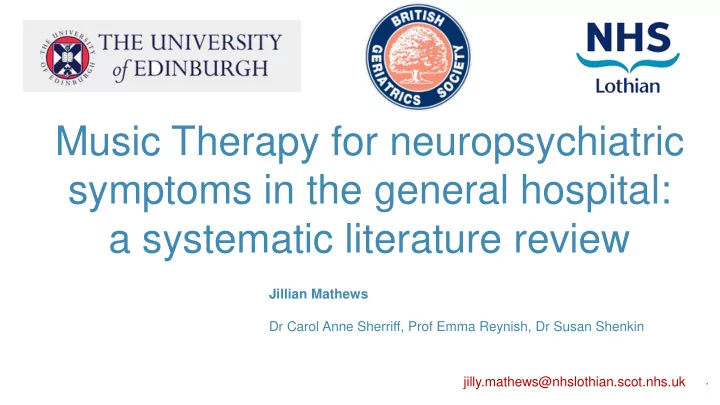

Music Therapy for neuropsychiatric symptoms in the general hospital: a systematic literature review Jillian Mathews Dr Carol Anne Sherriff, Prof Emma Reynish, Dr Susan Shenkin . jilly.mathews@nhslothian.scot.nhs.uk
Outline Background • Neuropsychiatric symptoms in acute care • Music Therapy • Aim Method • Search process • Selection Criteria • Data extraction Results • Not Music Therapy • Not dementia/ delirium • Not General Hospital Discussion • Quality assessment • Strengths and limitations • Conclusions & Implications
Background Neuropsychiatric symptoms in acute care Delirium • ‘acute neuropsychiatric syndrome…..’ • 20-30% of patients in general hospital • NICE Recommended non-pharmacological interventions Dementia • ~25% (~50% not diagnosed) in the general hospital • NICE Recommenced non-pharmacological interventions
Background – Music Therapy • Music Therapy (World Federation of Music Therapy) “The professional use of music and its elements as an intervention in medical, educational and everyday environments with individual, groups, families, or communities who seek to optimize their quality of life and improve their physical, social, communicative, emotional, intellectual and spiritual health and wellbeing.” Used to support those living with dementia in • Care homes • Psychiatric Settings NOT in General Hospitals •
Aim Does music therapy improve the neuropsychiatric symptoms of patients with delirium and dementia in the general hospital setting?
Method – Search process Review protocol PROSPERO (CRD42015024691) literature search (Medline, PsycINFO, CINAHL) keywords (dementia, delirium, neuropsychological symptoms, music therapy, general hospital) reference list of relevant reviews examined and forward citation hand searching (British Journal of Music Therapy) experts in field consulted
Method - Selection criteria Inclusion criteria: 1. Study Type: Published peer reviewed primary studies. 2. Study Group: groups of at least 10 adults (> 16 years old) inpatients in a general hospital with a diagnosis of dementia/ and or delirium 3. Study Intervention: MT delivered by a Music Therapist (registered) 4. Study Outcomes: Changes in NPS as measured by validated rating scales. Exclusion criteria: 1. Not a primary study 2. Not in a general hospital 3. Not music therapy 4. Not including dementia/ delirium
Method - Data extraction Planned to extract on: •Age •Dropout rate •Sex •Use of Scales •Method of recruitment •Intervention •Diagnostic criteria •Results •Setting •Risk of Bias •Number in study •Time scale
PRISMA Flow diagram Records identified through database searching R Medline n=896, PsycINFO n=1011, CINAHL n=3642 e Total records identified (n=5549) s Studies excluded not meeting u After duplicates inclusion criteria (n=4912) removed(n=5044) l Studies identified through other sources t (n=10) s Full text articles excluded: Full text articles screened for eligibility (n=142) Not a primary study (n=74) Not in a general hospital (n=42) Not music therapy (n=23) Not including dementia/ delirium (n=3) Studies included in qualitative synthesis (n=0)
Results - Not Music Therapy
Results - Not dementia/delirium
Results - Not general hospital
Discussion - Quality assessment Studies very small Randomisation and blinding not consistently applied or described Little consideration of bias Presence of delirium rarely considered Music rarely delivered by a music therapist Exposure to music in control groups not reported Dosage/ no of sessions variable.
Discussion - Strengths and limitations of methodology • Limitations • Review yielded no studies which fitted the inclusion criteria • May have missed foreign language articles • Japanese database may have been relevant • Following completion one study was found to meet our criteria • Creative music therapy in an acute care setting for older patients with delirium and dementia (Cheong et al., 2016) • Country – Singapore • Study design – cohort • Setting – acute geriatric unit • Subjects intervention/ control – 25 patients with dementia and/or delirium • Intervention – creative music therapy, 3*30 mins over 3 days. Scored on mood and engagement. • Strengths • Use of published and recognised guidelines and methods of how to conduct a systematic review • Double searching and data extraction • Experts were consulted
Conclusions and implications No published evidence for the use of music therapy for the treatment of dementia and delirium in the general hospital. Music delivery is feasible in this setting Music may have a positive effect on neuropsychological symptoms of dementia and delirium. Interdisciplinary collaboration is key Well designed randomised controlled trials of this complex intervention are needed.
References
References cont.
Acknowledgements Sheila Fisken, Librarian, (University of Edinburgh) Dr Philipa Derrington (Queen Margaret University, UK) Prof Hanne Mette Ridder (Aalborg University, Denmark) Prof Helen Odell Miller (Anglia Ruskin University, UK) Dr James Robertson (Edinburgh, UK) jilly.mathews@nhslothian.scot.nhs.uk
Recommend
More recommend